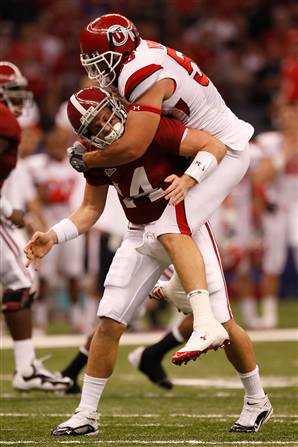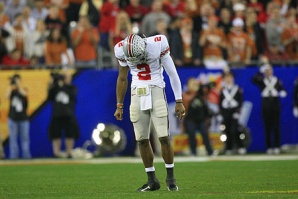Frank the Tank’s Slant Ballot – Week 11
| Rank | Team | Delta |
|---|---|---|
| 1 | Oregon Ducks | — |
| 2 | TCU Horned Frogs | — |
| 3 | Auburn Tigers | — |
| 4 | Boise St. Broncos | — |
| 5 | LSU Tigers |  7 7 |
| 6 | Wisconsin Badgers |  1 1 |
| 7 | Ohio St. Buckeyes |  1 1 |
| 8 | Stanford Cardinal |  3 3 |
| 9 | Nebraska Cornhuskers | — |
| 10 | Alabama Crimson Tide |  -4 -4 |
| 11 | Oklahoma St. Cowboys |  6 6 |
| 12 | Iowa Hawkeyes |  2 2 |
| 13 | Michigan St. Spartans |  3 3 |
| 14 | Arkansas Razorbacks |  4 4 |
| 15 | Utah Utes |  -10 -10 |
| 16 | Mississippi St. Bulldogs |  6 6 |
| 17 | Arizona Wildcats |  -4 -4 |
| 18 | Virginia Tech Hokies |  3 3 |
| 19 | Oklahoma Sooners |  -9 -9 |
| 20 | Missouri Tigers |  -5 -5 |
| 21 | Nevada Wolf Pack |  2 2 |
| 22 | South Carolina Gamecocks |  -3 -3 |
| 23 | Florida Gators | — |
| 24 | Texas A&M Aggies | — |
| 25 | USC Trojans | — |
| Dropouts: Baylor Bears, N.C. State Wolfpack, Illinois Fighting Illini | ||
SB Nation BlogPoll College Football Top 25 Rankings »
Some thoughts as we head into the weekend:
(1) Mr. Numb Existence – Somehow, I ended up with the Mr. Numb Existence Award this week in the BlogPoll that’s given to the pollster with the individual ballot closest to the overall result. This occurred even though I deviated from the overall poll almost immediately by putting TCU at #2 instead of Auburn. Regardless, and I say this as someone that has long been skeptical about the top-to-bottom quality of the non-AQ conferences, but TCU can and will pretty much kick the crap out of everyone this season.
(2) Mo Money, Mo Texas – Shortly after posting this generally blase post about the initially underwhelming projected financial figures for the Longhorn Sports Network, our good friend Chip Brown from Orangebloods.com reported that ESPN came in with a bid to pay Texas $12 million per year, which is a massive game-changing number on its face. This swung the pendulum in the public eye from “Why did Texas do this?” to “Texas could almost afford to pay Cam Newton if it wanted to”. The one reservation people should keep in mind is whether this $12 million per year includes radio and other media rights, as well, which this Austin American-Statesman article intimates. If that’s the case, then the $12 million figure isn’t necessarily that crazy. Ohio State’s radio and multimedia rights deal with IMG and RadiOhio is worth an average of $11 million per year, which is all on top what the Buckeyes receive from the Big Ten TV contracts. It’s unclear how the ESPN arrangement will interplay with the Texas deal with IMG, which is the primary multimedia rights holder for the school and is running the search for the Longhorn Network partner.
A question that I’ve been continuously getting is, “Why would ESPN be willing to pay so much for maybe one Texas football game per year and a handful of non-conference basketball games?” Well, one has to consider that since the Big Ten Network has been formed, ESPN has been overpaying for college sports in large part to prevent other conference networks from coming to fruition. Those networks represent extra competition to the Mothership itself along with taking away properties from its ESPN Regional syndication arm. The Worldwide Leader had to pay both the SEC and ACC hundreds of millions of dollars in Godfather offers in order to keep them bolting to competitors and starting their own networks. In contrast, ESPN has just destroyed the chances of a Big 12 network ever forming by paying a mere $12 million per year to Texas. When you look at it that way, $12 million is a complete bargain compared to what ESPN had to ward off potential competition from the SEC and ACC.
(3) Return of the WAC – Oh, poor WAC. This summer, it looked like it might nab BYU for non-football sports and possibly start a chain reaction where the Mountain West would start crumbling and the WAC could pick up the pieces. Instead, the MWC embarked on its own smack-down raid by grabbing Nevada and Fresno State on top of conference headliner Boise State and BYU ended up taking its non-football programs to the WCC, which left the WAC wondering if it would even have enough members for a football conference in 2011. It’s been a rough go-around for a non-AQ conference that has sent its champion to BCS bowls 3 out of the last 4 years.
At least the WAC will receive a reprieve with Nevada and Fresno State agreeing to stay until 2012, which is when replacements Texas State and the University of Texas-San Antonio come in for all sports and hockey/skiing power Denver joins as a non-football member. Rejection was still in the air for the WAC, though, as Montana declined an invite. (Note that Texas State, UTSA and Montana are all currently FCS schools, so the new WAC members will be moving up to the FBS level.)
Also, as discussed by a number of commenters, Hawaii is possibly the next most likely school to declare independence with a possible home for non-football sports in the Big West. I vacillate back-and-forth as to whether it’s a good idea for Hawaii to become an independent. In theory, it ought to be able to fill out its football schedule because of the extra game exemption provided by the NCAA, but we have already seen the Big Ten schools essentially abandon playing in Honolulu because of a combo of high costs and the desire to play more home games. As more BCS leagues go to 9-game conference schedules, Hawaii is going to face more challenges scheduling AQ teams than before. Finally, who knows whether the Big West schools are really going to be willing to shoulder the costs of sending non-football sports to the Honolulu, which means that Hawaii might need to hold onto its relationship with the WAC. On the other hand, Hawaii is uniquely attractive to a network like ESPN because its home games fit perfectly into late-night time slots on the mainland. Thus, it’s possible for Hawaii to get a BYU-type TV deal in place, which would make it more than worth it financially to become independent.
It appears that the conference realignment game will see the most action at the non-AQ level for the next few years besides an addition or two by the Big East… unless it decides to follow one of my “modest proposals” for the league that I’ll present next week. Until then, have a great weekend with Illini-Gopher football, Illini-Saluki basketball, Derrick Rose vs. John Wall and hopefully Julius Peppers decapitating Brett Favre.




